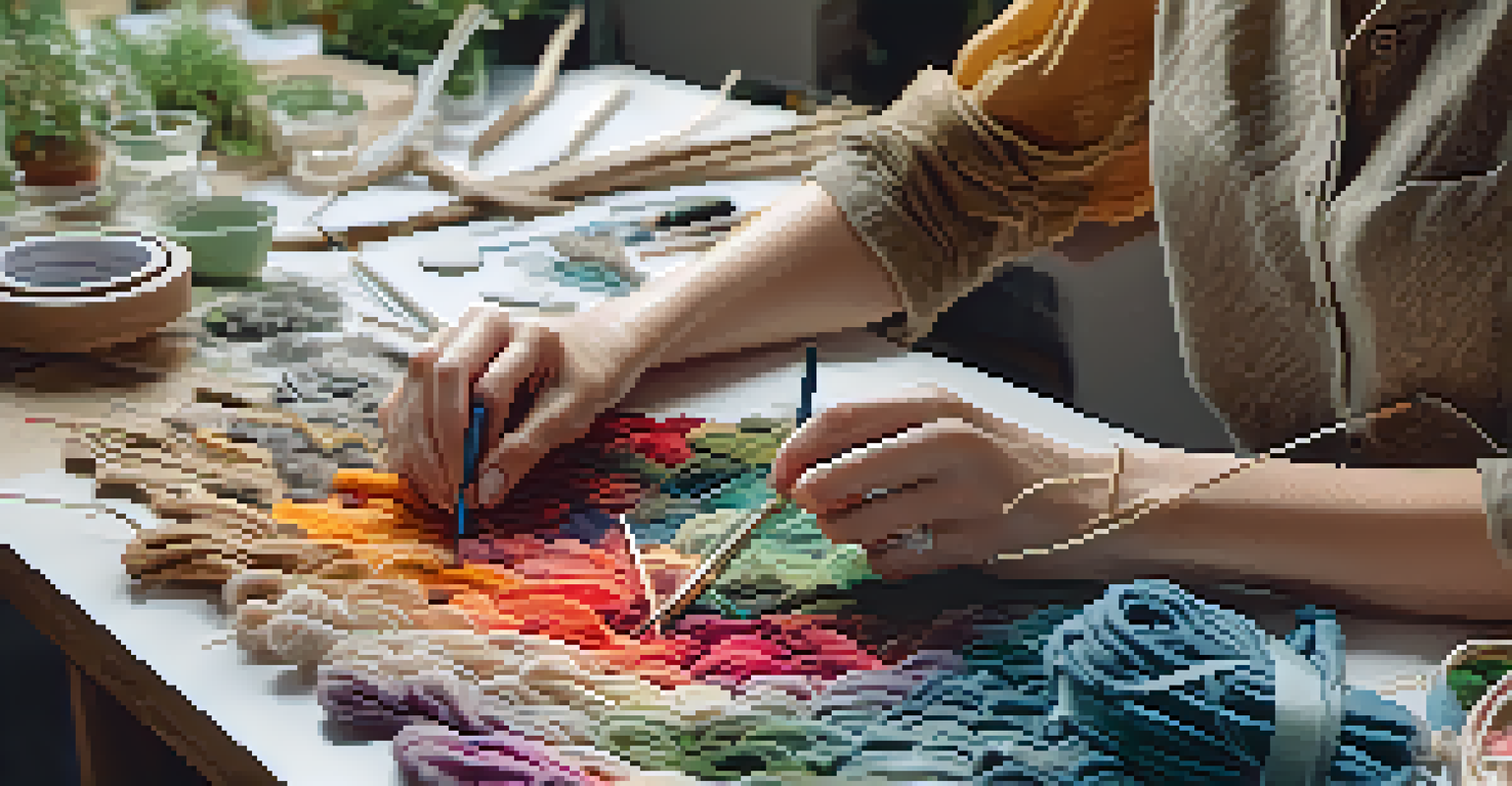Sustainable Fashion Weeks: Leading the Eco-Friendly Trend

The Rise of Sustainable Fashion Weeks Globally
Sustainable Fashion Weeks have emerged as pivotal events in the fashion calendar, promoting eco-consciousness in the industry. These events, held in cities around the world, showcase designers who prioritize sustainability in their collections. By focusing on eco-friendly materials, ethical labor practices, and innovative recycling methods, they challenge traditional fashion norms.
Fashion is a form of self-expression and an opportunity to express your values.
For instance, cities like Copenhagen and New York have made significant strides in integrating sustainability into their fashion weeks. They create platforms where designers can share their sustainable practices and inspire others to follow suit. This movement is not just about fashion; it's about fostering a collective responsibility towards our planet.
As awareness surrounding climate change grows, consumers are increasingly demanding transparency and accountability from brands. Sustainable Fashion Weeks are responding to this call, making it clear that eco-friendly practices are not just a trend—they're the future of fashion.
Innovative Designers Leading the Charge
A new wave of designers is at the forefront of the sustainable fashion movement, using their creativity to make a positive impact. Brands like Stella McCartney and Eileen Fisher have long been champions of eco-friendly practices, showcasing how style and sustainability can go hand in hand. Their collections often feature organic materials, recycled fabrics, and zero-waste designs.

These designers not only prioritize eco-conscious materials but also promote ethical labor practices. By ensuring fair wages and safe working conditions, they set a standard for the entire industry, inspiring other brands to adopt similar values. This approach not only builds trust with consumers but also contributes to a more equitable fashion ecosystem.
Sustainable Fashion Gains Momentum
Sustainable Fashion Weeks are emerging as vital platforms that promote eco-consciousness and inspire ethical practices in the fashion industry.
Moreover, many of these designers use their platforms to educate the public about the importance of sustainable fashion. Through workshops, talks, and social media campaigns, they engage with their audiences and encourage a shift towards more responsible consumer behavior.
The Role of Technology in Sustainable Fashion
Technology plays a crucial role in advancing sustainable fashion, offering innovative solutions to age-old problems. From 3D printing to blockchain, these technologies enable designers to create more sustainably and transparently. For example, 3D printing can significantly reduce fabric waste, allowing for precise designs that use only the necessary materials.
We have to stop asking whether we can afford to be sustainable, and start asking whether we can afford not to be.
Blockchain technology is also making waves by ensuring transparency in the supply chain. Consumers can trace the origin of their garments, verifying that the materials used are ethically sourced and environmentally friendly. This level of transparency builds trust and encourages brands to maintain high standards.
Additionally, smart textiles and biodegradable fabrics are on the rise, giving designers new materials to work with. These innovations not only enhance the fashion experience but also minimize the environmental impact, making sustainable choices more accessible for both designers and consumers.
Consumer Demand for Eco-Friendly Fashion
The demand for sustainable fashion is largely driven by conscious consumers who are more informed than ever. With the rise of social media, people have access to information about brands' practices and the environmental impact of their purchases. As a result, consumers are increasingly favoring brands that align with their values.
This shift in consumer behavior is prompting more brands to incorporate sustainability into their business models. Companies are now investing in eco-friendly materials and ethical production processes to meet the growing demand. This not only benefits the environment but also enhances brand loyalty and customer satisfaction.
Innovative Designers Drive Change
Leading designers like Stella McCartney are setting new standards by integrating sustainability into their collections and advocating for ethical labor practices.
Moreover, sustainable fashion is becoming a status symbol, with consumers proudly showcasing their eco-conscious choices. This cultural shift is encouraging more brands to embrace sustainability, fostering a competitive landscape where eco-friendly practices are the norm rather than the exception.
Challenges Facing Sustainable Fashion Weeks
Despite the positive momentum, Sustainable Fashion Weeks face several challenges that threaten their impact. One major hurdle is the tendency for 'greenwashing,' where brands exaggerate their sustainability efforts without making real changes. This can lead to consumer skepticism and undermine the genuine efforts of truly sustainable designers.
Additionally, the logistics of organizing a sustainable fashion week are complex. From sourcing eco-friendly materials to ensuring ethical labor practices, the entire process requires careful planning and commitment. Some organizers may struggle to meet these standards, which can affect the credibility of the event.
Lastly, there is the challenge of scalability. While many designers are committed to sustainability on a small scale, expanding these practices across larger brands can be difficult. Overcoming these obstacles will require collaboration among stakeholders, from designers to consumers, to create a truly sustainable fashion landscape.
The Impact of Sustainable Fashion Weeks on the Industry
Sustainable Fashion Weeks have the potential to reshape the fashion industry by setting benchmarks for sustainability. By highlighting innovative practices and showcasing responsible brands, they inspire others to follow suit. This ripple effect can lead to significant changes in how fashion is produced and consumed.
Moreover, these events create a sense of community among like-minded individuals and organizations. Designers, consumers, and activists come together to share ideas, collaborate on projects, and push for further change. This collective effort amplifies the message of sustainability and encourages more people to get involved.
Consumer Demand Shapes Fashion Trends
As consumers increasingly prioritize eco-friendly options, brands are adapting their business models to align with sustainability and ethical production.
As the impact of Sustainable Fashion Weeks continues to grow, they are likely to influence the mainstream fashion industry. This shift could lead to a future where sustainability is no longer an afterthought but an integral part of the fashion narrative.
The Future of Sustainable Fashion Weeks
Looking ahead, the future of Sustainable Fashion Weeks appears promising as more cities embrace the movement. With increasing awareness of environmental issues, these events are likely to become even more prominent. Cities around the globe are recognizing the importance of integrating sustainability into their fashion scenes.
Future Sustainable Fashion Weeks may also incorporate more diverse voices and perspectives, showcasing designers from various backgrounds and regions. This inclusivity can lead to new ideas and innovations that further enhance the sustainability narrative. Diversity in fashion can enrich the conversation and inspire creative solutions to global challenges.

Ultimately, as more consumers demand eco-friendly practices and brands continue to evolve, Sustainable Fashion Weeks will play a crucial role in shaping the industry's future. They are not just events; they are movements advocating for a more sustainable and responsible fashion industry.